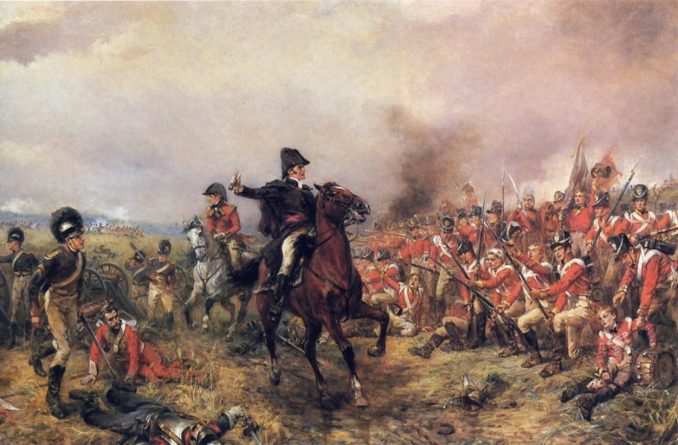
Robert Alexander Hillingford / Public domain
Napoleon was very dismissive of Arthur Wellesley referring to him as the sepoy General from his time spent in India. In contrast Wellesley said that Napoleon’s presence on the battlefield was worth 40,000 men. In the end, the sepoy General had the last laugh.
Wellington was well aware that his army in the Peninsula War was the only British Army. If he lost it there was no replacement; although he got lucky a couple of times, he was very careful with his actions. The French on the other hand would have no problem finding tens or even hundreds of thousands more men if needed.
The French had up to 300,000 men in Spain, Wellington had 55,000 at most. He did eventually have the Portuguese Army under his control and the Spanish Army and irregulars as allies though the Spanish Army was an extremely difficult ally. It was not long ago that they had been aligned with the French and the 1805 Battle of Trafalgar was still fresh in their minds. Had it not been for Napoleon installing his brother Joseph as their King they may well have been still aligned with the French.
The Spanish government, a Junta in Seville such as it was, was riven by self interest and jockeying for position. The Spanish Generals were in much the same turmoil, their “honour” being one of their many obsessions. Joining forces and supplying the British with provisions came a long way down their list of priorities. British commanders soon recognised that whatever the Spanish promised, either in the way of supplies or coordinated military action was most unlikely to happen.
When the French chased the Portuguese ruler away to exile in Brazil someone had to pick up the slack. It was the British who stepped in and supplied the money that kept Portugal going.
Arthur Wellesley was an odd chap but when you see what he had to put up with, it may offer an explanation. He wanted to be Commander in Chief of all the allied forces in the Peninsula. He never achieved this because the Spanish were too busy fighting each other as well as making occasional forays at the frogs. The Spanish Army does not come out of this war very well, the leaders of the guerrillas were much more effective and mostly helped us when they could.
Although Wellesley was in charge of the British Army, he could not pick and choose the ranks of Colonel and above. These were chosen by the Duke of York at the famous Horse Guards so frequently mentioned in Sharpe. Even among his own commanders there were some who vexed him frightfully and there was nothing he could do about them.
The British Army paid for its supplies. The locals were grateful for the money but it often came in the way of promissory notes that could be quickly redeemed in Lisbon where the local spivs took a healthy cut. Lack of money was but one of the British Army’s never ending problems. The higher British ranks did not always follow their orders, the Spanish would take ages to agree a plan and then ignored the bits they didn’t like and that was often most of it.
There was also the Portuguese government in Lisbon, the Spanish government in Seville and even the government in Whitehall had to be kept informed of the state of play and usually on the receiving end of pleas for more money. The whole bunch of politicians was a viper’s nest.
Back in London the Tories generally supported the war but the Whigs saw it as a waste of money. There was perpetual bickering between the two sides in the House of Shame and the newspapers.
Wellington’s military ability is well documented and widely known but I would like to concentrate on other aspects of the Peninsula War. One of the earliest examples is the battle of Talavera in July 1809. This battle featured in the Sharpe series, it was where he allegedly won a French Eagle and the other main claim to fame is where part of the Spanish Army fired a volley and then ran away in panic.
The litany of broken promises about supplies, the disagreements with the Spanish commander and the troops running away from their own volley in panic ensured that Sir Arthur never again trusted the Spanish Army as an ally.
Marshall Soult’s French Army had retreated from Portugal followed by 20,000 British troops The British troops were destined to join up with the 33,000 Spanish troops under General Cuesta. The politics among the Spanish high command was notorious. Each General suspected the others of trying to undermine him and have him removed. Cuesta was not in the best of health and that made him even more paranoid. He also suspected the British of conspiring against him and so it was difficult to get him to agree to any tactics suggested. He always saw the plans as designed to weaken his position and vetoed them.
When the British neared Talavera there was contact between the British and Spanish. Cuesta did not like any of the British suggestion and made three of his own, only one found any kind of favour with Wellington. When Cuesta received his reply, he again found fault with everything including at least one he had previously suggested himself. Meanwhile the French under Marshall Victor were on the move and that required yet more plans. By this stage Wellington had concluded that Cuesta would object to anything suggested by someone else.
Meanwhile, closer to Madrid, General Venegas, a fierce rival of Cuesta was supposed to be threatening the capital itself so the French would have to use troops to guard against such an event. Needless to say Venegas did very little and eventually ran away .
Back to the British, the logistics of operating in Iberia were far from settled and Wellington had to wait for his artillery, what little he had, and baggage to arrive. He was also short of cash to pay for things and the Spanish promises of food turned out to be useless, they couldn’t even feed their own. In fact their own Army began to emulate the French and loot whatever they could find from their own peasants.
Eventually the Spanish and British were forced together by circumstances and during the battle Wellington had the misfortune of seeing a Spanish Regiment flee at the sound of their own volley. In mitigation it can be said that these were raw troops who had never heard a volley before. Nonetheless it did nothing to inspire confidence in the ability of the Spanish Army.
Never again would the British rely on Spanish assistance. If they were there and helped all well and good but if they turned up late or not at all then so be it. The guerrillas intercepted many French messages and handed them over to the British. Napoleon’s contact with his forces in Spain was sporadic at best.
Wellington later was Prime Minister but his tenure wasn’t a success. Having put up with so much treachery in the Peninsula War maybe he expected it to be much easier in Westminster but I fear it was no better than it is now.
© well_chuffed 2025



